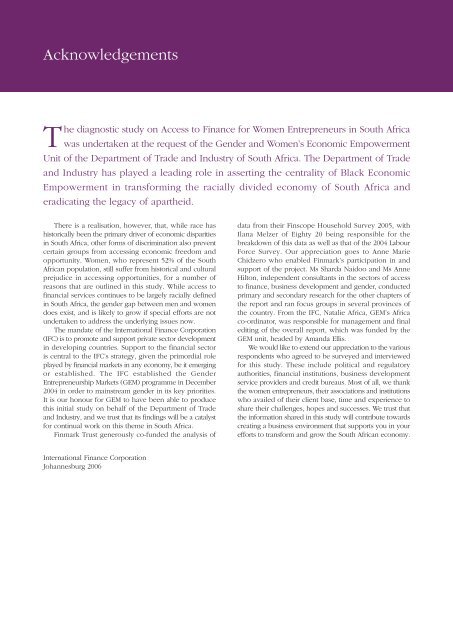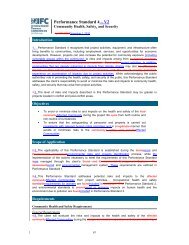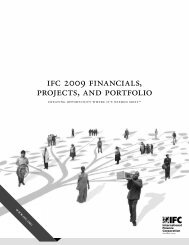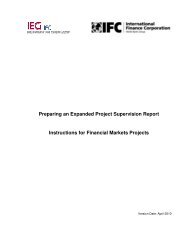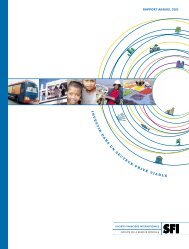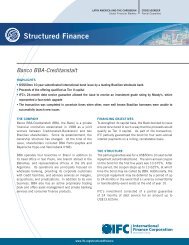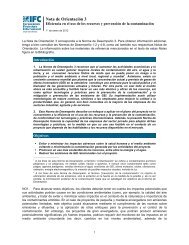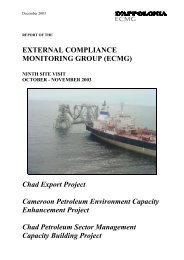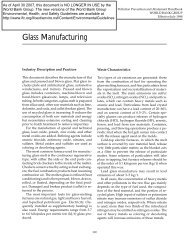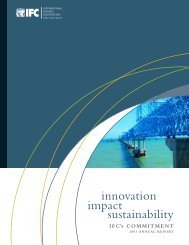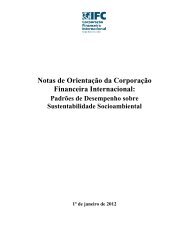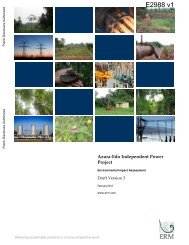Diagnostic Study on Access to Finance for Women.pdf - IFC
Diagnostic Study on Access to Finance for Women.pdf - IFC
Diagnostic Study on Access to Finance for Women.pdf - IFC
You also want an ePaper? Increase the reach of your titles
YUMPU automatically turns print PDFs into web optimized ePapers that Google loves.
Acknowledgements<br />
T<br />
he diagnostic study <strong>on</strong> <strong>Access</strong> <strong>to</strong> <strong>Finance</strong> <strong>for</strong> <strong>Women</strong> Entrepreneurs in South Africa<br />
was undertaken at the request of the Gender and <strong>Women</strong>’s Ec<strong>on</strong>omic Empowerment<br />
Unit of the Department of Trade and Industry of South Africa. The Department of Trade<br />
and Industry has played a leading role in asserting the centrality of Black Ec<strong>on</strong>omic<br />
Empowerment in trans<strong>for</strong>ming the racially divided ec<strong>on</strong>omy of South Africa and<br />
eradicating the legacy of apartheid.<br />
There is a realisati<strong>on</strong>, however, that, while race has<br />
his<strong>to</strong>rically been the primary driver of ec<strong>on</strong>omic disparities<br />
in South Africa, other <strong>for</strong>ms of discriminati<strong>on</strong> also prevent<br />
certain groups from accessing ec<strong>on</strong>omic freedom and<br />
opportunity. <strong>Women</strong>, who represent 52% of the South<br />
African populati<strong>on</strong>, still suffer from his<strong>to</strong>rical and cultural<br />
prejudice in accessing opportunities, <strong>for</strong> a number of<br />
reas<strong>on</strong>s that are outlined in this study. While access <strong>to</strong><br />
financial services c<strong>on</strong>tinues <strong>to</strong> be largely racially defined<br />
in South Africa, the gender gap between men and women<br />
does exist, and is likely <strong>to</strong> grow if special ef<strong>for</strong>ts are not<br />
undertaken <strong>to</strong> address the underlying issues now.<br />
The mandate of the Internati<strong>on</strong>al <strong>Finance</strong> Corporati<strong>on</strong><br />
(<strong>IFC</strong>) is <strong>to</strong> promote and support private sec<strong>to</strong>r development<br />
in developing countries. Support <strong>to</strong> the financial sec<strong>to</strong>r<br />
is central <strong>to</strong> the <strong>IFC</strong>’s strategy, given the primordial role<br />
played by financial markets in any ec<strong>on</strong>omy, be it emerging<br />
or established. The <strong>IFC</strong> established the Gender<br />
Entrepreneurship Markets (GEM) programme in December<br />
2004 in order <strong>to</strong> mainstream gender in its key priorities.<br />
It is our h<strong>on</strong>our <strong>for</strong> GEM <strong>to</strong> have been able <strong>to</strong> produce<br />
this initial study <strong>on</strong> behalf of the Department of Trade<br />
and Industry, and we trust that its findings will be a catalyst<br />
<strong>for</strong> c<strong>on</strong>tinual work <strong>on</strong> this theme in South Africa.<br />
Finmark Trust generously co-funded the analysis of<br />
data from their Finscope Household Survey 2005, with<br />
Ilana Melzer of Eighty 20 being resp<strong>on</strong>sible <strong>for</strong> the<br />
breakdown of this data as well as that of the 2004 Labour<br />
Force Survey. Our appreciati<strong>on</strong> goes <strong>to</strong> Anne Marie<br />
Chidzero who enabled Finmark’s participati<strong>on</strong> in and<br />
support of the project. Ms Sharda Naidoo and Ms Anne<br />
Hilt<strong>on</strong>, independent c<strong>on</strong>sultants in the sec<strong>to</strong>rs of access<br />
<strong>to</strong> finance, business development and gender, c<strong>on</strong>ducted<br />
primary and sec<strong>on</strong>dary research <strong>for</strong> the other chapters of<br />
the report and ran focus groups in several provinces of<br />
the country. From the <strong>IFC</strong>, Natalie Africa, GEM’s Africa<br />
co-ordina<strong>to</strong>r, was resp<strong>on</strong>sible <strong>for</strong> management and final<br />
editing of the overall report, which was funded by the<br />
GEM unit, headed by Amanda Ellis.<br />
We would like <strong>to</strong> extend our appreciati<strong>on</strong> <strong>to</strong> the various<br />
resp<strong>on</strong>dents who agreed <strong>to</strong> be surveyed and interviewed<br />
<strong>for</strong> this study. These include political and regula<strong>to</strong>ry<br />
authorities, financial instituti<strong>on</strong>s, business development<br />
service providers and credit bureaus. Most of all, we thank<br />
the women entrepreneurs, their associati<strong>on</strong>s and instituti<strong>on</strong>s<br />
who availed of their client base, time and experience <strong>to</strong><br />
share their challenges, hopes and successes. We trust that<br />
the in<strong>for</strong>mati<strong>on</strong> shared in this study will c<strong>on</strong>tribute <strong>to</strong>wards<br />
creating a business envir<strong>on</strong>ment that supports you in your<br />
ef<strong>for</strong>ts <strong>to</strong> trans<strong>for</strong>m and grow the South African ec<strong>on</strong>omy.<br />
Internati<strong>on</strong>al <strong>Finance</strong> Corporati<strong>on</strong><br />
Johannesburg 2006


